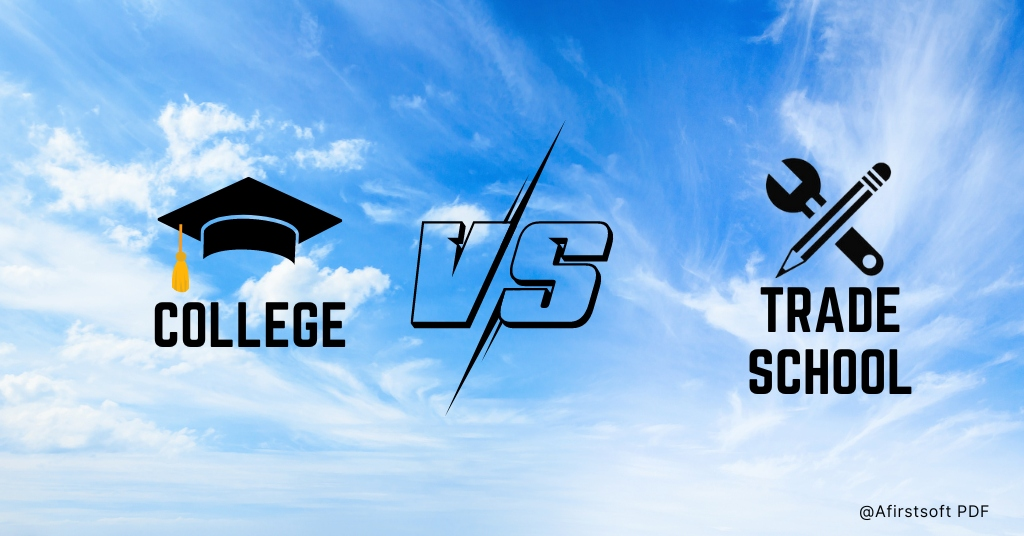Trade schools versus colleges are two forms of higher education institutions that differ in the opportunities they provide to their learners. Vocational schools prepare students for specific trades or occupations, such as welding, plumbing, electrical work, cosmetology, etc. These programs are usually shorter than traditional academic programs, which take several months and two years to complete, and are meant to produce workforce-ready graduates. Colleges, on the other hand, provide a more general education, generally in four years, and results in a bachelor's degree. College courses are offered in many fields, such as arts, science, business, and humanities, and focus on analysis, research, and theory.

Selecting the right path is very important because it defines further work experience, financial investment, and satisfaction. Trade schools are more likely to provide well-paying jobs with less debt and time investment, thus, suitable for those who know what they want and are ready to work without delay. Universities, however, can offer a more diverse education and can lead to a number of professions that may require additional education and can help a person grow as an individual and develop his or her intellect. It is possible to make a wise decision concerning the choice of the college in light of one’s career plans, learning styles, and financial capability.
- 100% secure
- 100% secure
- 100% secure
Part 1. What Is Trade School Vs College: Understanding the Differences
Let’s evaluate the distinctions and trade school vs college pros and cons in detail.
Trade School
Vocational colleges provide specialized education for particular trades or occupations. Programs focus on the application of concepts and skills in real-life situations. Students learn in fields such as plumbing, electrical work, and automobile repair. The main objective is to equip the students for the labor market without delay. Vocational schools usually provide courses that take less time to complete than traditional universities, and these courses result in certification or licensing. This practical approach makes sure that the graduates are fit to face the market when they are through with their courses. The education is quite intensive and specific, which prepares students for the respective trade.
College
Colleges offer a diverse curriculum in different disciplines of study. They provide all round education in arts, science, commerce, and many others. Courses are laid down to foster critical thinking, research, and theoretical knowledge. It is possible to obtain an associate's, bachelor's, master's, or doctoral degree. College education helps students to pursue various professional fields and further education. It is more extensive, which enables one to study multiple fields of knowledge. Colleges are in a position to develop all round citizens with a wealth of knowledge in their areas of specialization.
Duration of Programs
Vocational education usually lasts a shorter duration than college education and can take anywhere from a few months to two years. This makes it possible for students to join the workforce market easily. It usually takes four years of college programs to get a bachelor’s degree. Graduate programs take extra years to complete. Vocational colleges provide a fast track to the job market with specialized, limited training. College programs offer a broader educational process. This longer duration enables the students to go deeper into their areas of study and also be educated in a broader range of information.
Practicality vs. Theory
Vocational schools are defined by the practical methods of learning that are used in the acquisition of skills. Students solve real-life cases using the right tools and methods that are applicable in the market. This prepares them to look for employment opportunities once they are through with their college education. The emphasis on practical experience contributes to the enhancement of the assurance that the graduates are ready for the job market.
Universities focus on academic material and problem-solving skills. These components of the curriculum are lectures, research assignments, and examinations. This assists in the formation of abstract thinking and improves one’s perception of different issues. It is beneficial in preparing the students for careers that require a good understanding of concepts.
Vocational schools are concerned with skills and training for employment. Universities offer a more complex learning process and a vision of the subject from a different perspective. Both of them are equally beneficial and are aimed at people with different goals in their careers. The students from vocational schools and colleges are placed in different sectors. Each is significant for the formation of the workforce and the sphere of higher education.
- 100% secure
- 100% secure
- 100% secure
Part 2. Pros and Cons of Trade School

Let’s compare the benefits and limitations of trade schools
Pros of Trad School
- Vocational colleges offer specialized training for certain professions, which enables the learners to acquire relevant knowledge and skills in the shortest time possible.
- Courses offered in trade schools are generally shorter than those offered in colleges and universities, hence enabling students to get a job as soon as possible.
- Trade school programs are cheaper than colleges because they take less time to complete and have no requirements for basic courses.
- Most trade schools also have excellent industry relations that guarantee the students’ employment after completing their training.
- Graduates of trade schools receive certifications or licenses, which are very useful in the market, especially in specific sectors.
- The practical nature of education in trade schools ensures that the learners are placed in real-life working environments upon completion of their studies.
- Trade schools also provide their classes at night and on the weekends to allow students who are working to attend classes.
- Trade school graduates have less student loan debt because the programs are shorter and less expensive than traditional college.
Cons of Trade School:
- Trade schools are specific to particular trades, and this may limit employment chances compared to colleges.
- Still, graduates of trade schools can start working earlier than college graduates; however, they will earn less in their lifetime.
- Vocational schools are typically more focused on the training of practical knowledge and skills as opposed to general and comprehensive theoretical knowledge.
- The other disadvantage of attending trade schools is that graduates are limited in their flexibility in switching from one field to another.
- This is because trade schools are more inclined to the practical part of learning, and this, in one way or another, means they cover very little theory.
- Trade school programs may not have as many networking and internship opportunities as colleges.
- Some jobs may have certain specifications, such as the employer wanting the candidate to have a college degree, especially in a specific field or industry.
- Trade school education is unsuitable for those who expect more than just education in their preferred trade.
- When making a decision between trade school and college, one must consider the strengths and weaknesses of each option.
- 100% secure
- 100% secure
- 100% secure
Part 3. Trade School vs Community College: Weighing the Options

Vocational schools are institutions that focus on offering training in specific trades, for instance, welding, HVAC, or culinary. These programs are more skills-based and generally have shorter durations than college programs.
On the other hand, community colleges provide a broader range of programs, such as vocational training, associate degrees, and credits that can be transferred to universities within four years. They offer a broader education with opportunities for vocational training and academic programs as well.
The flexibility of community colleges.
Flexibility is another aspect of community colleges. The institutions can meet the needs of the students and their tight schedules. They provide day, evening, and weekend classes to ensure that education is provided to working adults and other busy people.
This flexibility applies to the spectrum of programs, from the vocational ones, for instance, nursing or computer science, to the academic ones, for example, literature, mathematics, or social sciences. The programs can be selected according to the preferences of the students and their future occupations.
The Possibilities of Transferring Credits Earned at Community College
Another benefit of taking a community college is the possibility of transferring credits to a four-year college. Most of the community colleges have articulated with universities whereby students can easily transfer to the universities and pursue their bachelor’s degrees.
This transferability is advantageous to students who want to advance to other universities after beginning with the community college courses that are cheaper. It is an affordable way of attaining a degree and has the advantage of allowing students to try out various options in their education.
- 100% secure
- 100% secure
- 100% secure
Part 4. College or Trade School: Making the Right Choice
Let’s discuss some key factors to consider before selecting between the two.
- Career Goals: A person has to consider his or her future job and make a choice whether it is better to go to college and get a degree or to get a vocational education. Consider the requirements of the field and the opportunities for further work after selecting a certain type of education.
- Personal Interests: Based on the interest level, aptitude, and abilities, one should be able to decide which educational path will be more fulfilling. Consider the compatibility of your interests with specific trades or academic fields.
- Financial Situation:Consider your financial resources, which include savings, scholarships, and potential student loans. Compare the costs of college education, including tuition fees, fees for other services, and the cost of living, to the costs of trade school programs.
- Preferred Learning Style: Consider your learning style and the approaches that would be more suitable in this case. Determine if you are okay with the more hands-on, vocational style of learning that is typical of trade schools or if you are more of a traditional college student.
- Job Market Trends: Research the existing employment opportunities for the target group and the need for skilled employees in the different fields. Consider which educational track will make you prepared for the job market and which one will provide you with an opportunity to progress in your career.
The Urgency of Studying and Investigating
The choice between college or trade school is a significant one that should be made by looking at the factors from various perspectives. Here are some detailed steps that will guide you in making the right decision:
- Gather Information:First of all, perform a literature search and campus visits to different colleges and trade schools. Investigate their programs, accreditation, success rate, the employment rate of their graduates, and testimonies. This will assist you in identifying what each institution offers and whether it is helpful to you.
- Consider Alternatives:Other learning formats, such as apprenticeships, online classes, or certification programs, should be considered. Choose the method of learning that is more suitable for you in terms of time and future occupation. One must also not forget that these alternatives can also provide valuable skills and accreditation.
- Visit Campuses:Never underestimate the role of campus tours. It is advised that you visit the campuses of the colleges and trade schools of your choice. Go to the campus, attend information sessions and campus tours, and interact with students and graduates. This will help you evaluate the learning environment, facilities, and ambiance of the learning institution.
- Seek Guidance: It is advisable to consult counselors, career advisors, or anyone who has had prior experience in the specific field of interest. It can give you information, advice, and even a valuable opinion on your areas of interest, abilities, and goals.
With all these factors in mind and doing your homework, you can make the right choice and begin the journey toward the right career and the achievement of your dreams.
Part 5. Summary
The blog post focuses on the need to consider one’s priorities and needs when deciding vocational school vs trade school. Some of the issues covered include the choice of career, interests, financial status, and learning modality. The readers are therefore urged to seek information, consider options, tour colleges, and consult in order to make a decision.
It is important to emphasize that college and trade school can be beneficial and provide a good job, so the decision should be made depending on the person and his or her goals. Thus, readers can select the most suitable educational path that meets their plans after critically analyzing the options.
- 100% secure
- 100% secure
- 100% secure





